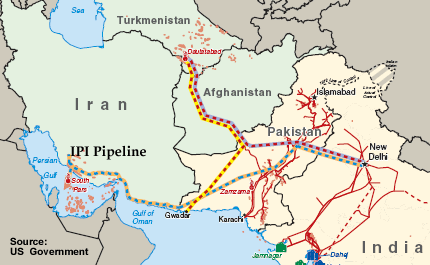
The Turkmenistan-Afghanistan-Pakistan-India (TAPI) Gas Pipeline Project, a mega infrastructure initiative aiming to bring natural gas from Turkmenistan’s Galkynysh field through Afghanistan to Pakistan and India, has made significant progress in recent months. On November 2, 2024, Zabihullah Mujahid, the spokesperson for the Taliban, posted a video on X showing that the TAPI project was effectively underway on Afghan soil. The video indicated the construction of the pipeline was moving forward, underscoring the project’s potential to transform the energy landscape of the region.
However, as the TAPI project gains momentum, there are growing concerns over India’s continued participation. India, which has long been a crucial partner in the TAPI project, is reportedly reconsidering its involvement in light of the evolving political and security situation in Afghanistan under the Taliban’s rule. India’s potential withdrawal from the project would have significant implications, not only for regional energy security but also for Afghanistan’s reconstruction and regional cooperation.
The TAPI pipeline is one of the most ambitious regional infrastructure projects, designed to transport natural gas from Turkmenistan’s vast Galkynysh gas field to Pakistan and India via Afghanistan. With a projected length of over 1,800 kilometers, the pipeline is expected to provide a reliable and affordable energy source to the three countries, which are heavily dependent on energy imports. The gas pipeline promises to reduce the cost of energy and offer a more stable supply, addressing some of the energy challenges faced by Pakistan and India, while also contributing to Afghanistan’s development through transit revenues.
For Afghanistan, the TAPI pipeline is more than just an energy project; it holds the potential to transform the country into a key regional transit hub. As the pipeline crosses Afghan territory, Afghanistan stands to benefit from substantial transit fees, which could play a pivotal role in stabilizing its economy. These revenues are seen as essential for rebuilding the country and improving the livelihoods of its people, particularly in the wake of decades of conflict and political instability. Moreover, the project is viewed as a key mechanism for fostering greater regional cooperation and strengthening ties between Central Asia, South Asia, and the broader region.
For Pakistan, the TAPI pipeline is critical for ensuring long-term energy security. Pakistan’s energy needs are growing rapidly, and its reliance on energy imports from countries like Iran and China, as well as domestic production from aging fields, has put pressure on the country’s energy infrastructure. The TAPI project, by supplying gas from Turkmenistan, would diversify Pakistan’s energy sources and reduce its dependence on costly oil and other energy imports. The pipeline also enhances Pakistan’s position as a key player in regional connectivity. As the pipeline passes through Pakistan, the country not only benefits from the energy supply but also from the strategic importance of being at the center of this crucial energy route.
India’s involvement in the TAPI project has been significant since its inception. As one of the largest consumers of natural gas in the region, India stood to benefit from the project in terms of cheaper and more reliable energy supplies. The pipeline would also foster closer economic ties between India and Central Asia, potentially unlocking trade opportunities and increasing the region’s economic interconnectivity. However, India’s continued participation in the project is uncertain. Since the Taliban’s return to power in Afghanistan in August 2021, India has expressed concerns about the security situation in the country. The Taliban’s control of Afghanistan has made India wary about the potential risks of transporting energy supplies through a country that is seen as unstable and lacking in governance structures.
India’s potential withdrawal from the project would deprive Afghanistan of the critical transit revenues it stands to earn from the pipeline. Given Afghanistan’s dire economic situation and the challenges it faces in securing international aid, the revenues from the TAPI project are essential for its reconstruction and long-term stability. India’s exit from the project would not only undermine Afghanistan’s prospects for economic recovery but also signal a missed opportunity for India to contribute to the stability and growth of the region.
Hence, the role of Afghan Taliban gets more significance in bringing stability in their home. Beyond its position as a transit country, Afghanistan is also a potential beneficiary of the project’s success. The pipeline offers a chance for Afghanistan to emerge from decades of conflict and economic underdevelopment by providing essential revenue streams. However, the country’s ongoing political instability, coupled with security concerns, presents a serious risk to the realization of this potential. The Taliban’s governance, while claiming to be committed to improving the country’s economy, has been met with skepticism by many international stakeholders, including India. If India were to withdraw from the TAPI project, it could have a domino effect on the region’s efforts to bring stability and growth to Afghanistan.
India’s decision on whether to stay involved in the project will have far-reaching consequences, both for the TAPI pipeline and for regional dynamics. If India chooses to withdraw, it could undermine the long-term viability of the project and stall the economic development of Afghanistan, which is already facing significant challenges. Conversely, if India maintains its commitment to the project, it could serve as a model for regional cooperation and help stabilize Afghanistan’s economy.
The TAPI project’s success hinges on the ability of all involved parties to prioritize long-term regional stability over short-term political considerations. If the project progresses without major disruptions, it could ultimately become a symbol of hope for the region, demonstrating the power of collaboration in achieving mutual prosperity and security. As the project moves forward, it is crucial for all stakeholders to continue working together to overcome the challenges and ensure that TAPI realizes its full potential.
